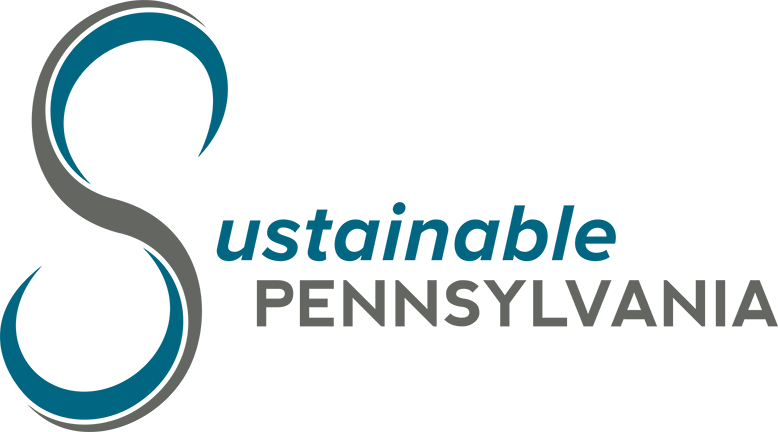Sustainable Pennsylvania is a free and voluntary municipal certification program created to assess a local government’s measure of sustainability and provide a curated list of resources and opportunities to help the community improve. A project of the Pennsylvania Municipal League and Sustainable Pittsburgh, Sustainable PA helps municipalities achieve sustainability goals, empowering them to save money, conserve resources, and innovate to improve the lives of their residents. It encourages the municipality to work towards creating a positive and regenerative relationship with the environment. Sustainable PA brings statewide and national recognition to the municipality as sustainability is embedded in operational policy, everyday practices, and the community.
Program Overview
Sustainable PA provides a municipal government the opportunity to assess how they are doing when compared to a comprehensive list of best practices and metrics. These best practices and metrics were created and refined with the help of more than 60 local and national expert advisors, including municipal managers and staff, elected officials, attorneys, engineers, planners, state agency leaders, academics, and other practitioners.
- There are more than 150 point-earning criteria to which municipal officials respond.
- The program topics areas include:
- Economic Development and Revitalization
- Strategic Engagement and Resilience
- Energy
- Land Use and Housing
- Parks and Land Conservation
- Water
- Waste and Materials Management
- Municipal Operations
- Health and Public Safety
- Transportation
Recognition
The program awards participating municipalities with a certification that acknowledges the municipality’s progress in addressing the topics covered in the program. When a municipality’s program submission is reviewed and approved the municipality is awarded one of the following certification levels, a designation that is valid for three years.
- Platinum
- Gold
- Silver
- Bronze
If the municipality does not achieve bronze during the first attempt, they will be listed as ‘Registered’ on the site and are provided the opportunity to work towards a higher level whenever they wish.
To find out more about what is required to obtain each level please see Certification Levels.
Improve, Reassess, and Earn a Higher Certification!
Municipalities who engage with the free program have access to their own Sustainable PA account where they are able to view their current and past achievements, pull reports about their past assessments, future goals, and the co-benefits of their actions, and access a wealth of resources. The municipality is encouraged to return to the program, review their ‘future goals’ and work to improve their sustainability over time.
- A Sustainable Pennsylvania Certification is valid for 3 years.
- The reassessment process is streamlined to encourage new actions as opposed to re-answering previously answered questions.
- To achieve this many questions in the program do not expire when the certification does. Some don’t expire for 4 years or longer.
Action Resources
Sustainable PA also provides municipal officials with technical resources to take action, improve policy and impacts, and affords them the opportunity to assess and reassess progress over time.
- There will be more than 50 resource documents tied to specific actions that include descriptions and/or step by step guidance.
- The resource documents will also include links to best practices, case studies, funding opportunities, programs, and organizations that support those actions.
Impact Tags
Sustainable PA uses impact tags to measure not just the benefits of a given set of actions but also the co-benefits. We use the following set of impact tags to illustrate and analyze the benefits and co-benefits of each question in the program. Those tags are:
- Carbon Reduction – any action that reduces GHG consumption or production
- Social Equity – actions that improve social and racial equity
- Climate Resilience – actions that will lead to organizations or communities that are more resilient to the shocks or stressors of climate change.
- Economic Wellbeing – actions that will create economic growth, better incomes, and/or working environments
- Natural Ecosystems – actions that protect, preserve, and/or regenerate natural ecosystems including, air, land, water, flora, and fauna.
- Resource Conservation – actions that help reduce waste and conserve resources throughout the life cycle of a product or service (this does not include energy or materials used in energy creation)
- Health and Wellness – actions that improve the health and wellness of community members.
- Community and Network Building – actions that build community through durable social connections, vibrant inclusive places, and resilient institutions.
- Capacity Building – actions that will build the capacity of the organization or community to practice sustainability.
- Transparency and Ethics – actions that increase the transparency of the organization and/or addresses ethical concerns.
- Measurable Impact – answers will provide quantifiable data about measurable impacts
- Cost Savings – actions that will save the organization or community money
Municipal governments that earn Certification in the system will be able to pull reports about their past performance based on the impact tags above.
Positive Impacts
Earning a Sustainable Pennsylvania Certification provides a number of positive impacts for an aspiring municipality:
- Improves the municipality’s chances of obtaining grants and loans from the Pennsylvania Department of Community and Economic Development (DCED) – the program is formally recognized in DCED’s municipal funding application process.
- It improves transparency by providing the municipality with a profile on the Sustainable PA website that highlights the work they have done.
- Signals to the community, businesses and organizations that the municipality prioritizes the policies and practices of highly effective local governments.
- Lowers the risk of taking actions that may be novel to community leaders by providing them with proven best practices, evidence of related successes, and potential funding opportunities.
- Helps the municipal administration establish a sustainability baseline for planning and implementing best practices.
- Creates a clear pathway for continuous improvement that includes custom reporting tools.
- Fosters a conversation among municipal management, staff, elected officials, residents, and local employers about what is possible.
- Creates and/or strengthens a network of high performing municipalities for sharing information and mutual assistance,
